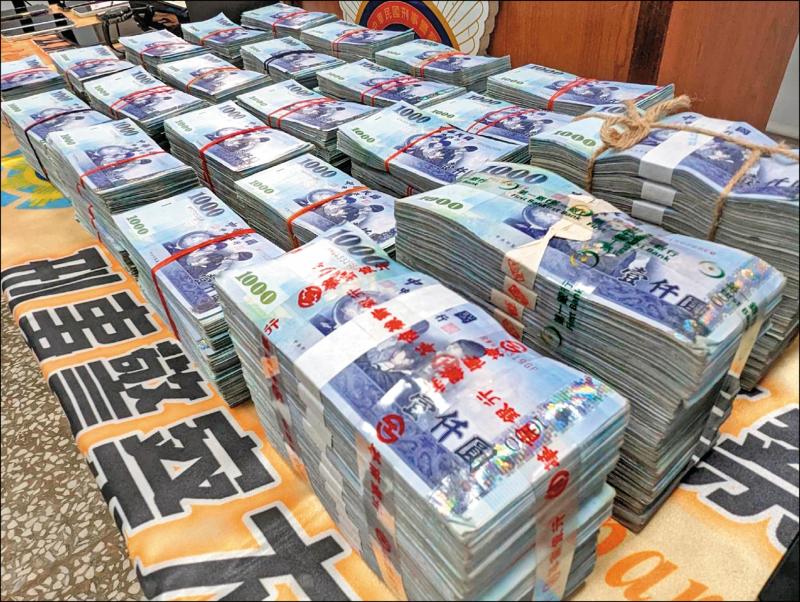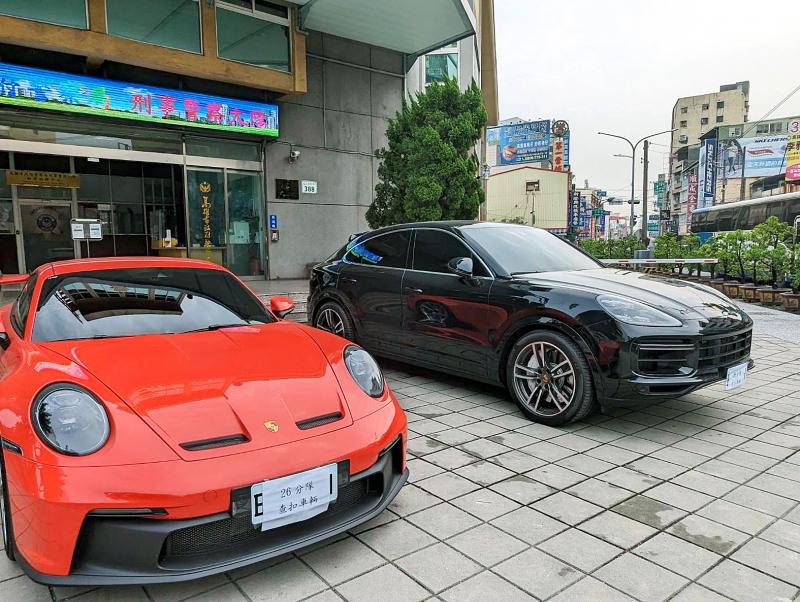Kaohsiung police last week busted a money laundering operation suspected of seeking to interfere in tomorrow’s local elections.
The operation was allegedly headed by a man surnamed Lee (李), who had received NT$9.5 billion (US$306.18 million) from China over the past six months, Kaohsiung police said yesterday, adding that Lee’s ring is suspected to be part of a larger Chinese effort to interfere in the elections and support pro-China candidates.
Officers arrested Lee, 35, and his girlfriend, searched his mansion, and seized the money he had allegedly received from China and three luxury vehicles, police said.

Photo courtesy of Kaohsiung police
The operation was disguised as an online gambling and betting site, police said, adding that they had surveilled Lee for several months after an investigation into an earlier money laundering case indicated that he is engaging in illegal activities.
Lee would be charged with contravening the Money Laundering Control Act (洗錢防制法), police said.
His communications records showed that he had contacts in China, who are suspected to be behind the fund transfers, police said, adding that the investigation is ongoing.

Photo courtesy of Kaohsiung police
The purpose of the transfers remains unclear, as does the identity of those involved in China, police said.
Lee’s operation might also be connected to rings uncovered earlier this year that had allegedly received large sums of money from Chinese operatives, they said.
Earlier this month, police searched a house owned by a couple in Taichung, where they seized NT$17 billion, allegedly originating in China, and four luxury vehicles in one of the largest such raids this year.
Prosecutor Chan Chang-hui (詹常輝) said the couple’s online gaming site allegedly also offered illicit banking and foreign remittance services, which were used by illegal gambling sites in China.
They might also have had links to Chinese government agencies seeking to interfere in the local elections, Chan said.
Prosecutors are working to “combat illegal Chinese money transfers to Taiwan,” Chan said, adding that this includes “cryptocurrencies, underground remittances and gaming proceeds.”
The Chinese government and its proxies had tried to interfere in previous elections by illegally funding the campaigns of pro-China candidates, Chan said, adding that this also involved illegal transfers to money laundering rings.
China also uses these strategies to destabilize Taiwan’s financial institutions and fund organized crime operations, as it seeks to undermine public safety in the nation, Chan said.
In the past, Beijing has helped pro-China candidates pay campaign expenses, including offices, vehicles, staff, printing costs, rallies and deposits for listing as candidates, Chan said.
It also funded candidates’ illegal vote-buying attempts, Chan added.

DAREDEVIL: Honnold said it had always been a dream of his to climb Taipei 101, while a Netflix producer said the skyscraper was ‘a real icon of this country’ US climber Alex Honnold yesterday took on Taiwan’s tallest building, becoming the first person to scale Taipei 101 without a rope, harness or safety net. Hundreds of spectators gathered at the base of the 101-story skyscraper to watch Honnold, 40, embark on his daredevil feat, which was also broadcast live on Netflix. Dressed in a red T-shirt and yellow custom-made climbing shoes, Honnold swiftly moved up the southeast face of the glass and steel building. At one point, he stepped onto a platform midway up to wave down at fans and onlookers who were taking photos. People watching from inside

A Vietnamese migrant worker yesterday won NT$12 million (US$379,627) on a Lunar New Year scratch card in Kaohsiung as part of Taiwan Lottery Co’s (台灣彩券) “NT$12 Million Grand Fortune” (1200萬大吉利) game. The man was the first top-prize winner of the new game launched on Jan. 6 to mark the Lunar New Year. Three Vietnamese migrant workers visited a Taiwan Lottery shop on Xinyue Street in Kaohsiung’s Gangshan District (崗山), a store representative said. The player bought multiple tickets and, after winning nothing, held the final lottery ticket in one hand and rubbed the store’s statue of the Maitreya Buddha’s belly with the other,

‘NATO-PLUS’: ‘Our strategic partners in the Indo-Pacific are facing increasing aggression by the Chinese Communist Party,’ US Representative Rob Wittman said The US House of Representatives on Monday released its version of the Consolidated Appropriations Act, which includes US$1.15 billion to support security cooperation with Taiwan. The omnibus act, covering US$1.2 trillion of spending, allocates US$1 billion for the Taiwan Security Cooperation Initiative, as well as US$150 million for the replacement of defense articles and reimbursement of defense services provided to Taiwan. The fund allocations were based on the US National Defense Authorization Act for fiscal 2026 that was passed by the US Congress last month and authorized up to US$1 billion to the US Defense Security Cooperation Agency in support of the

HIGH-TECH DEAL: Chipmakers that expand in the US would be able to import up to 2.5 times their new capacity with no extra tariffs during an approved construction period Taiwan aims to build a “democratic” high-tech supply chain with the US and form a strategic artificial intelligence (AI) partnership under the new tariffs deal it sealed with Washington last week, Taipei’s top negotiator in the talks said yesterday. US President Donald Trump has pushed Taiwan, a major producer of semiconductors which runs a large trade surplus with the US, to invest more in the US, specifically in chips that power AI. Under the terms of the long-negotiated deal, chipmakers such as Taiwan Semiconductor Manufacturing Co (TSMC, 台積電) that expand US production would incur a lower tariff on semiconductors or related manufacturing